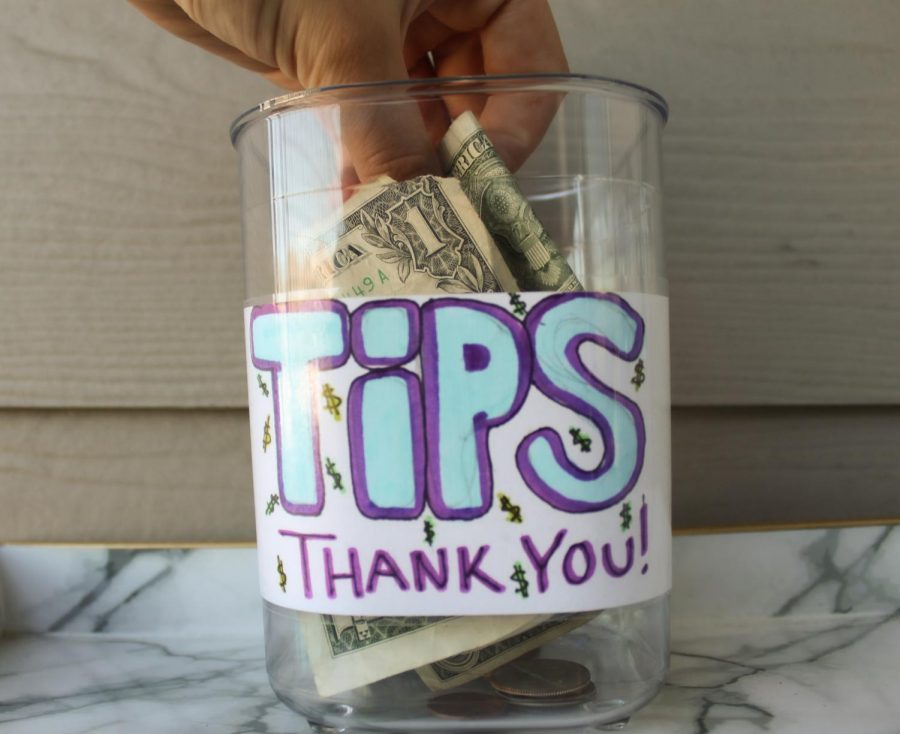Bringhurst: Stop Stiffing, Start Tipping
A tip jar in Salt Lake City, Utah on Tuesday, Sept. 21, 2021. (Photo by Brooklyn Critchley | The Daily Utah Chronicle)
September 23, 2021
The early stages of the pandemic solicited advertisements, “thank you” notes and free meals for essential workers. Large corporations seemingly oozed with gratitude. In hindsight, it was grotesquely disingenuous.
Service workers were left in the dust without an increase in wages, and now some people are tipping workers less than before the start of the pandemic. Our government needs to change labor laws to compensate tipped workers fairly, but until that happens, you can make a difference by tipping.
Utahns’ meager tipping habits combined with the state’s exploitative regulations make it hard for tipped workers to make a living wage. Until this is changed, employees rely on your generosity.
Common tipping practices shift blame away from employers and onto employees. Under the guise of tipping, employees are responsible for their own income, but actually, there are protocols that prevent workers from being fairly paid.
“Tip pooling” is often implemented in Utah, where tips are split between multiple staff members. This means individuals are less motivated by tips and leaving a tip based on service quality isn’t effective.
Some restaurants implement “mandatory service charges,” which can be easily confused for a tip — but an employer can claim all of those charges. These regulations make it hard for workers to reap the rewards of providing good service. The responsibility to earn a living wage still falls on the worker despite the employers and lawmakers enforcing regulations that make this near impossible.
Employers continued to shift responsibility to their workers during the pandemic. Food service workers deemed “essential” risk their health every day to make ends meet. A study by Healthcare Research and Quality showed that 60% of essential workers are at a higher risk of severe COVID-19.
Many Utah restaurants and bars have returned to full seating capacity but are understaffed, making it hard to provide prompt service. The restaurant maintains a steady income, while the workers are overworked and struggling to receive decent tips. This is especially consequential because many waiters are paid as low as $2.13 an hour and rely on tips as their primary source of income.
If hourly wage and tips amount to less than the federal minimum wage of $7.25, the employer must compensate for the difference. Providing stellar service might not be enough to surpass $7.25 an hour, especially if you’re stiffed by patrons. Even making $7.25 per hour, these essential workers don’t make enough money to afford their essential needs.
Utahns tip less than almost every other state, according to a 2019 data sample by MoneyPenny. “In Utah, people don’t tip very well. It’s a thing. It doesn’t seem like people are taught how to tip correctly. A lot of people will just round up to the nearest dollar,” said Tyler Saunders, a waiter in Salt Lake City.
The pandemic hasn’t improved tipping habits, either. Though many experts called for an increase in tipping, people are tipping less on average now than before the pandemic.
A survey done by UC Berkeley showed more than 80% of workers reported that their tips declined during the pandemic. Notably, there was a period of time at the start of the pandemic where people tipped well. Customers empathized with essential workers — but empathy was only stretched so far. Eventually, tipping declined, likely because people are tight on money, but continue to go out to eat.
Empathy is a large factor in tipping habits. People with experience in the service industry tend to tip more. In contrast, well-off Utah families may not have personal experience working in service. As Utah’s economy consistently grows, so does the number of wealthy Utahns. According to Utah Business, millionaires make up 7.06% of Utah’s population, higher than the national average. It’s possible that this high-income population doesn’t empathize with service workers and is less inclined to leave generous tips.
Workers in the service industry rely on tips. It’s your responsibility to understand how your tip personally impacts your server. Customs such as take-out food, delivery drivers and digital tipping have become the new norm, but society hasn’t settled on when tipping is necessary. Although these variants are ultimately up to personal preference, it is important to consider that most tipped workers rely on your gratuity, whether it’s take-out or dine-in. Tipping experts generally recommend leaving behind 18 to 25%, especially during the pandemic. Tipping via cash is ideal because credit cards often charge transaction fees that Utah law allows to be deducted from the tip.
If you waited twenty minutes for the waiter to take your order, consider the circumstances before reflecting the experience in your tip. If you want to reward an exceptional job, throw in some extra cash. But considering the impact frugal tipping has on employees, it is rarely warranted to reduce a tip based on poor experience. Systemic changes clearly need to be made to compensate tipped workers fairly, but until that happens, we all need to do our part. If you can’t afford the tip, you can’t afford the service.










Greg Scotto • Sep 25, 2021 at 9:11 pm
I don’t have any employees and am, therefore, not the least bit responsible for what other people earn. Not only is it not my business what anyone makes in wages, I don’t care. Here’s the thing…if you’re not making enough money at your current job, find a different on that pays more…or get a second job…or don’t. I don’t care, that part’s up to you.
Solved another one…
Jason • Oct 19, 2021 at 9:04 am
Let me translate for you, Greg. You’re cheap.